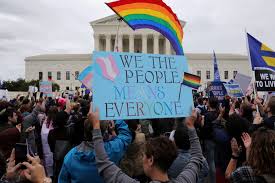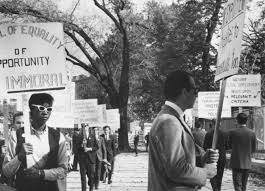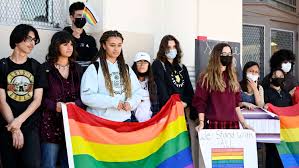Title: Advancing LGBTQ Rights: A Journey Towards Equality and Inclusion
Introduction:
LGBTQ rights have been at the forefront of social and political discussions in recent years. While significant progress has been made, there is still work to be done to ensure equality, acceptance, and protection for individuals within the LGBTQ community. This article delves into the importance of LGBTQ rights, highlights key milestones achieved, and explores the ongoing challenges faced by this community.
The Struggle for Equal Rights:
For decades, LGBTQ individuals have faced discrimination, prejudice, and marginalization in various aspects of their lives. From employment opportunities to housing rights, access to healthcare, and legal recognition of relationships, their struggle for equal treatment has been an uphill battle.
Milestones Achieved:
Over time, significant milestones have been achieved in the fight for LGBTQ rights. One landmark moment was the Stonewall Riots in 1969 when members of the LGBTQ community stood up against police harassment at the Stonewall Inn in New York City. This event sparked a wave of activism that led to the birth of the modern LGBTQ rights movement.
Since then, strides have been made in areas such as decriminalizing homosexuality, legalizing same-sex marriage, implementing anti-discrimination laws, and allowing transgender individuals to serve openly in the military. These victories have brought about greater visibility and acceptance for LGBTQ individuals.
Ongoing Challenges:
Despite these advancements, challenges persist. Many countries still criminalize homosexuality or impose severe penalties on those who identify as LGBTQ. Transgender individuals face unique struggles regarding gender identity recognition and access to healthcare. Bullying and violence against LGBTQ youth remain prevalent issues that demand attention.
Furthermore, achieving comprehensive legal protections against discrimination based on sexual orientation or gender identity continues to be a battle fought on multiple fronts. Advocacy efforts are crucial to ensure that existing laws are enforced effectively and new legislation is enacted where needed.
Importance of LGBTQ Rights:
LGBTQ rights are not just about legal protections; they are about fostering a society that embraces diversity, dignity, and inclusivity. LGBTQ individuals deserve the same opportunities, rights, and respect as anyone else. By advancing LGBTQ rights, we create a world where everyone can live authentically without fear of discrimination or prejudice.
The Role of Allies:
Support from allies is vital in the journey towards achieving full equality for the LGBTQ community. Allies play a crucial role in challenging harmful stereotypes, advocating for inclusive policies, and creating safe spaces for LGBTQ individuals. By standing together, we can amplify the voices of those who have been marginalized and work towards a more equitable society.
Conclusion:
The fight for LGBTQ rights is an ongoing struggle that requires persistent efforts from individuals, communities, organizations, and governments. While progress has been made, there is still much to be done to ensure equal treatment and protection for all LGBTQ individuals worldwide. By actively supporting LGBTQ rights and fostering acceptance, we can help create a more inclusive future where diversity is celebrated and everyone can thrive without fear of discrimination or prejudice.
Frequently Asked Questions: LGBTQ Rights in the United States and Beyond
- What are LGBTQ rights?
- What is the current status of LGBTQ rights in the United States?
- Are there still countries where being LGBTQ is illegal?
- How can I support LGBTQ rights as an ally?
- What can I do if I face discrimination based on my sexual orientation or gender identity?
What are LGBTQ rights?
LGBTQ rights refer to the legal and social protections and freedoms that are sought and advocated for by lesbian, gay, bisexual, transgender, and queer individuals. These rights encompass various aspects of life, including but not limited to:
- Legal Recognition: LGBTQ rights involve seeking legal recognition and protection for same-sex relationships through the legalization of same-sex marriage or civil unions. It also includes fighting for legal recognition of gender identity for transgender individuals.
- Non-Discrimination: LGBTQ individuals strive for laws that prohibit discrimination based on sexual orientation or gender identity in areas such as employment, housing, education, healthcare, public accommodations, and access to services.
- Family Rights: This aspect focuses on securing legal recognition and protections for LGBTQ families, including adoption rights and access to assisted reproductive technologies.
- Anti-Bullying and Hate Crime Legislation: Advocacy efforts aim to combat bullying and violence against LGBTQ individuals by pushing for comprehensive anti-bullying policies in schools and hate crime legislation that specifically includes sexual orientation and gender identity.
- Healthcare Equality: LGBTQ rights encompass equal access to healthcare services without discrimination based on sexual orientation or gender identity. This includes advocating for transgender-inclusive healthcare coverage, mental health support specific to LGBTQ needs, and HIV/AIDS prevention and treatment.
- Military Service: Advocacy seeks to ensure that LGBTQ individuals can serve openly in the military without discrimination or exclusion based on their sexual orientation or gender identity.
- Legal Gender Recognition: Transgender rights involve securing the ability to legally change one’s gender marker on identification documents without unnecessary requirements or barriers.
- Education & Awareness: Promoting inclusive education that acknowledges diverse sexual orientations and gender identities is an essential part of LGBTQ rights advocacy. This involves creating safe spaces in educational institutions and implementing inclusive curricula that teach respect for all individuals regardless of their sexual orientation or gender identity.
- Freedom of Expression & Assembly: LGBTQ rights include protecting the freedom of expression and assembly for LGBTQ individuals and allies, allowing them to peacefully demonstrate, advocate, and celebrate their identities.
- Global Advocacy: The fight for LGBTQ rights extends beyond national borders, with efforts to raise awareness and support global initiatives that seek to decriminalize homosexuality, combat human rights abuses, and promote equality worldwide.
By advocating for these rights, LGBTQ individuals strive for equal treatment under the law and in society, aiming to create a more inclusive and accepting world where everyone can live authentically and without fear of discrimination or prejudice.
What is the current status of LGBTQ rights in the United States?
The current status of LGBTQ rights in the United States is a complex and evolving landscape. While significant progress has been made in recent years, there are still areas where LGBTQ individuals face discrimination and lack legal protections.
- Marriage Equality: In 2015, the landmark Supreme Court case Obergefell v. Hodges legalized same-sex marriage nationwide, granting LGBTQ couples the right to marry and have their marriages recognized in all states.
- Employment Discrimination: In June 2020, the Supreme Court ruled in Bostock v. Clayton County that Title VII of the Civil Rights Act of 1964 protects LGBTQ individuals from workplace discrimination based on sexual orientation or gender identity.
- Adoption and Parenting: LGBTQ individuals can adopt children in all states, although some religious-based adoption agencies have sought exemptions to deny services to same-sex couples based on religious beliefs.
- Transgender Rights: Transgender rights have seen advancements, but challenges persist. Some states have implemented laws protecting transgender individuals from discrimination in areas such as employment, housing, and public accommodations. However, other states have passed restrictive legislation targeting transgender youth’s access to healthcare and participation in sports.
- Conversion Therapy Bans: Many states have enacted laws banning conversion therapy for minors, recognizing it as a harmful practice that seeks to change a person’s sexual orientation or gender identity.
- Military Service: Since 2011, openly gay and lesbian individuals can serve openly in the U.S. military. In 2016, transgender individuals were also allowed to serve openly; however, there have been attempts to restrict their service since then.
- Healthcare Protections: In 2020, the Affordable Care Act was interpreted by the Department of Health and Human Services to include protections against discrimination based on sexual orientation and gender identity in healthcare settings.
- Federal Legislation: The Equality Act is proposed federal legislation seeking comprehensive protections against discrimination based on sexual orientation and gender identity in areas such as employment, housing, and public accommodations. It has been passed by the House of Representatives but awaits Senate consideration.
It is important to note that LGBTQ rights can vary from state to state, with some states providing more comprehensive protections than others. Additionally, challenges persist in areas such as transgender rights, religious exemptions, and access to healthcare. The ongoing fight for LGBTQ rights involves advocacy efforts at various levels to ensure equal treatment and protection for all individuals regardless of their sexual orientation or gender identity.
Are there still countries where being LGBTQ is illegal?
Yes, unfortunately, there are still countries where being LGBTQ is illegal. As of 2021, approximately 69 countries have laws that criminalize consensual same-sex sexual activity. These laws vary in severity, ranging from imprisonment to the death penalty.
In some countries, same-sex relationships are explicitly criminalized under “sodomy laws” or “anti-gay laws.” These laws not only violate the basic human rights and dignity of LGBTQ individuals but also contribute to a culture of discrimination and persecution.
It’s important to note that even in countries where homosexuality is not explicitly criminalized, LGBTQ individuals may still face social stigma, discrimination, and violence due to cultural or religious beliefs. This can result in a hostile environment that restricts their freedom and hinders their ability to live authentically.
International human rights organizations and activists continue to work tirelessly to advocate for the decriminalization of homosexuality worldwide and promote acceptance and equality for LGBTQ individuals. Efforts include raising awareness, engaging in diplomatic pressure, supporting local LGBTQ organizations, and challenging discriminatory laws through legal avenues.
While progress has been made in some regions, it is crucial to continue pushing for change until every person can live without fear of persecution or discrimination based on their sexual orientation or gender identity.
How can I support LGBTQ rights as an ally?
Supporting LGBTQ rights as an ally is crucial in creating a more inclusive and accepting society. Here are some ways you can actively support the LGBTQ community:
- Educate Yourself: Take the time to educate yourself about LGBTQ history, terminology, and issues. Understand the challenges faced by this community and learn about their experiences. This knowledge will help you engage in informed conversations and advocate effectively.
- Listen and Amplify Voices: Actively listen to the experiences and stories of LGBTQ individuals. Make an effort to understand their perspectives, challenges, and triumphs. Use your platform and privilege to amplify their voices by sharing their stories, achievements, and struggles.
- Challenge Stereotypes: Be aware of your own biases and challenge harmful stereotypes or assumptions about LGBTQ individuals. Speak up against discriminatory language or jokes when you encounter them, even in casual conversations. Encourage others to do the same.
- Support LGBTQ Organizations: Contribute your time, skills, or resources to local or national LGBTQ organizations that work towards equality and inclusion. Volunteer at events, donate funds, or offer your professional expertise to support their initiatives.
- Advocate for Inclusive Policies: Support legislation that protects LGBTQ rights at local, national, and international levels. Write letters or emails to elected officials expressing your support for inclusive policies such as anti-discrimination laws, marriage equality, transgender rights protections, and comprehensive sex education.
- Be an Ally in Everyday Life: Create a safe space for LGBTQ individuals in your personal and professional life by being supportive and inclusive. Use gender-neutral language when appropriate (e.g., using “partner” instead of assuming someone’s marital status). Respect people’s chosen names and pronouns.
- Engage in Dialogue: Engage in respectful conversations with friends, family members, colleagues, or acquaintances who may hold misconceptions about the LGBTQ community. Share your knowledge and personal experiences as an ally to help dispel myths and promote understanding.
- Attend LGBTQ Events: Show your support by attending LGBTQ events, such as Pride parades, community gatherings, or awareness campaigns. This visible support helps create a sense of belonging for LGBTQ individuals and demonstrates solidarity.
- Stay Informed and Engaged: Keep up with current events and issues affecting the LGBTQ community. Stay informed about ongoing struggles, victories, and challenges. Engage in discussions on social media platforms or attend educational workshops to deepen your understanding.
- Reflect on Your Privilege: Recognize your privilege as an ally and use it to uplift marginalized voices. Understand that being an ally is an ongoing journey of learning and growth. Continuously reflect on your own biases and actions to ensure you are actively supporting equality for all.
By taking these steps, you can make a meaningful difference in supporting LGBTQ rights as an ally and contribute to the creation of a more inclusive society for everyone.
What can I do if I face discrimination based on my sexual orientation or gender identity?
Facing discrimination based on sexual orientation or gender identity can be a challenging experience, but there are steps you can take to address the situation and protect your rights. Here are some actions you can consider:
- Know your rights: Familiarize yourself with the laws and protections in your country, state, or region regarding discrimination based on sexual orientation or gender identity. Research local anti-discrimination laws, employment policies, and housing regulations to understand what rights you have.
- Document incidents: Keep a record of any incidents where you experience discrimination. Note down dates, times, locations, individuals involved, and details of what happened. This documentation can be valuable evidence if you decide to take legal action or file a complaint.
- Seek support: Reach out to supportive friends, family members, or LGBTQ organizations who can offer guidance and emotional support during this time. They may be able to provide resources or refer you to legal experts who specialize in LGBTQ rights.
- Report the discrimination: Depending on the situation, consider reporting the discrimination to relevant authorities such as human rights commissions or equality offices in your area. They may be able to investigate the incident and take appropriate action.
- File a complaint: If applicable, file a formal complaint with an appropriate agency or organization that handles discrimination cases related to employment, housing, education, or public services. Provide them with all relevant information and documentation.
- Seek legal advice: Consult with an attorney who specializes in LGBTQ rights or discrimination cases. They can provide guidance on your specific circumstances and advise you on potential legal avenues available for seeking justice.
- Connect with advocacy organizations: Reach out to local LGBTQ advocacy organizations that specialize in addressing discrimination issues. They may offer resources, support networks, and legal assistance tailored to your needs.
- Educate yourself and others: Stay informed about LGBTQ rights and educate yourself about the experiences of others within the community facing similar challenges. Sharing knowledge and raising awareness can help combat discrimination in the long run.
Remember, your safety and well-being are paramount. If you feel threatened or in immediate danger, prioritize your personal safety and seek assistance from local authorities or emergency services.





Leave a Reply